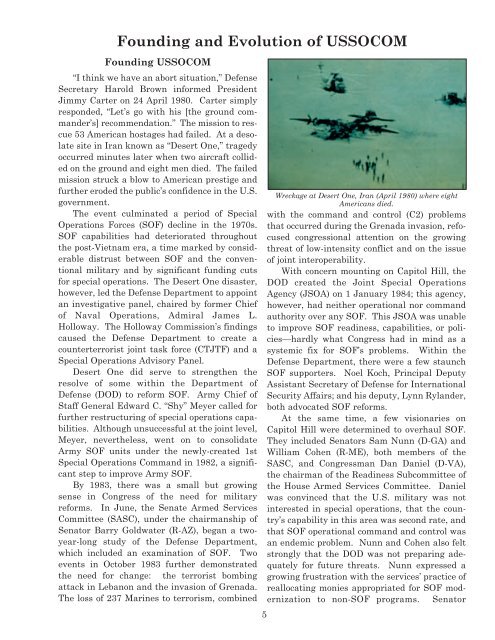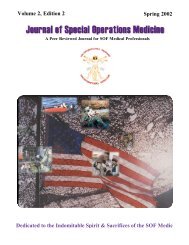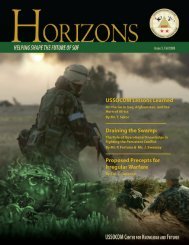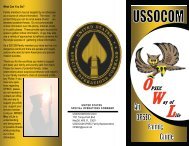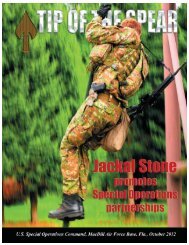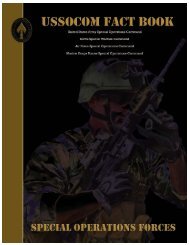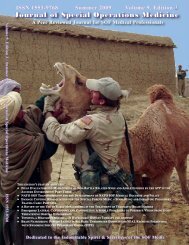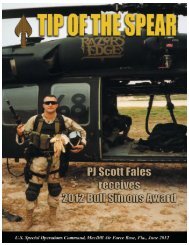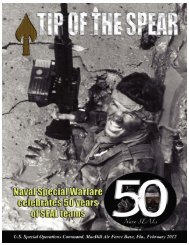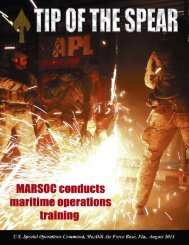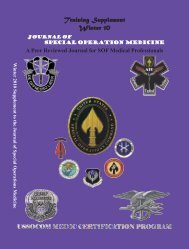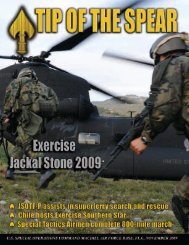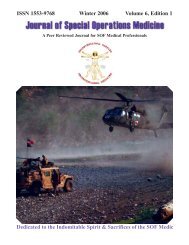HQ$History - United States Special Operations Command
HQ$History - United States Special Operations Command
HQ$History - United States Special Operations Command
You also want an ePaper? Increase the reach of your titles
YUMPU automatically turns print PDFs into web optimized ePapers that Google loves.
Founding and Evolution of USSOCOM<br />
Founding USSOCOM<br />
“I think we have an abort situation,” Defense<br />
Secretary Harold Brown informed President<br />
Jimmy Carter on 24 April 1980. Carter simply<br />
responded, “Let’s go with his [the ground commander’s]<br />
recommendation.” The mission to rescue<br />
53 American hostages had failed. At a desolate<br />
site in Iran known as “Desert One,” tragedy<br />
occurred minutes later when two aircraft collided<br />
on the ground and eight men died. The failed<br />
mission struck a blow to American prestige and<br />
further eroded the public’s confidence in the U.S.<br />
government.<br />
The event culminated a period of <strong>Special</strong><br />
<strong>Operations</strong> Forces (SOF) decline in the 1970s.<br />
SOF capabilities had deteriorated throughout<br />
the post-Vietnam era, a time marked by considerable<br />
distrust between SOF and the conventional<br />
military and by significant funding cuts<br />
for special operations. The Desert One disaster,<br />
however, led the Defense Department to appoint<br />
an investigative panel, chaired by former Chief<br />
of Naval <strong>Operations</strong>, Admiral James L.<br />
Holloway. The Holloway Commission’s findings<br />
caused the Defense Department to create a<br />
counterterrorist joint task force (CTJTF) and a<br />
<strong>Special</strong> <strong>Operations</strong> Advisory Panel.<br />
Desert One did serve to strengthen the<br />
resolve of some within the Department of<br />
Defense (DOD) to reform SOF. Army Chief of<br />
Staff General Edward C. “Shy” Meyer called for<br />
further restructuring of special operations capabilities.<br />
Although unsuccessful at the joint level,<br />
Meyer, nevertheless, went on to consolidate<br />
Army SOF units under the newly-created 1st<br />
<strong>Special</strong> <strong>Operations</strong> <strong>Command</strong> in 1982, a significant<br />
step to improve Army SOF.<br />
By 1983, there was a small but growing<br />
sense in Congress of the need for military<br />
reforms. In June, the Senate Armed Services<br />
Committee (SASC), under the chairmanship of<br />
Senator Barry Goldwater (R-AZ), began a twoyear-long<br />
study of the Defense Department,<br />
which included an examination of SOF. Two<br />
events in October 1983 further demonstrated<br />
the need for change: the terrorist bombing<br />
attack in Lebanon and the invasion of Grenada.<br />
The loss of 237 Marines to terrorism, combined<br />
Wreckage at Desert One, Iran (April 1980) where eight<br />
Americans died.<br />
with the command and control (C2) problems<br />
that occurred during the Grenada invasion, refocused<br />
congressional attention on the growing<br />
threat of low-intensity conflict and on the issue<br />
of joint interoperability.<br />
With concern mounting on Capitol Hill, the<br />
DOD created the Joint <strong>Special</strong> <strong>Operations</strong><br />
Agency (JSOA) on 1 January 1984; this agency,<br />
however, had neither operational nor command<br />
authority over any SOF. This JSOA was unable<br />
to improve SOF readiness, capabilities, or policies—hardly<br />
what Congress had in mind as a<br />
systemic fix for SOF’s problems. Within the<br />
Defense Department, there were a few staunch<br />
SOF supporters. Noel Koch, Principal Deputy<br />
Assistant Secretary of Defense for International<br />
Security Affairs; and his deputy, Lynn Rylander,<br />
both advocated SOF reforms.<br />
At the same time, a few visionaries on<br />
Capitol Hill were determined to overhaul SOF.<br />
They included Senators Sam Nunn (D-GA) and<br />
William Cohen (R-ME), both members of the<br />
SASC, and Congressman Dan Daniel (D-VA),<br />
the chairman of the Readiness Subcommittee of<br />
the House Armed Services Committee. Daniel<br />
was convinced that the U.S. military was not<br />
interested in special operations, that the country’s<br />
capability in this area was second rate, and<br />
that SOF operational command and control was<br />
an endemic problem. Nunn and Cohen also felt<br />
strongly that the DOD was not preparing adequately<br />
for future threats. Nunn expressed a<br />
growing frustration with the services’ practice of<br />
reallocating monies appropriated for SOF modernization<br />
to non-SOF programs. Senator<br />
5


